Remarks by the President in Final Press Conference. (excerpt re: Russia)

(The White House – Office of the Press Secretary – January 18, 2017)
Q Mr. President, thank you. The President-elect has said that he would consider lifting sanctions on Russia if they substantially reduced their nuclear stockpile. Given your own efforts at arms control, do you think that’s an effective strategy? Knowing this office and Mr. Trump, how would you advise his advisors to help him be effective when he deals with Vladimir Putin? And given your actions recently on Russia, do you think those sanctions should be viewed as leverage?
THE PRESIDENT: Well, a couple of things. Number one, I think it is in America’s interest and the world’s interest that we have a constructive relationship with Russia. That’s been my approach throughout my presidency. Where our interests have overlapped, we’ve worked together. At the beginning of my term, I did what I could to encourage Russia to be a constructive member of the international community, and tried to work with the President and the government of Russia in helping them diversify their economy, improve their economy, use the incredible talents of the Russian people in more constructive ways.
I think it’s fair to say that after President Putin came back into the presidency that an escalating anti-American rhetoric and an approach to global affairs that seemed to be premised on the idea that whatever America is trying to do must be bad for Russia and so we want to try and counteract whatever they do — that return to an adversarial spirit that I think existed during the Cold War has made the relationship more difficult. And it was hammered home when Russia went into Crimea and portions of Ukraine.
The reason we imposed the sanctions, recall, was not because of nuclear weapons issues. It was because the independence and sovereignty of a country, Ukraine, had been encroached upon, by force, by Russia. That wasn’t our judgment; that was the judgment of the entire international community. And Russia continues to occupy Ukrainian territory and meddle in Ukrainian affairs and support military surrogates who have violated basic international law and international norms.
What I’ve said to the Russians is, as soon as you’ve stop doing that the sanctions will be removed. And I think it would probably best serve not only American interest but also the interest of preserving international norms if we made sure that we don’t confuse why these sanctions have been imposed with a whole set of other issues.
On nuclear issues, in my first term we negotiated the START II treaty. and that has substantially reduced our nuclear stockpiles, both Russia and the United States. I was prepared to go further. I told President Putin I was prepared to go further. They have been unwilling to negotiate. If President-elect Trump is able to restart those talks in a serious way, I think there remains a lot of room for our two countries to reduce our stockpiles. And part of the reason we’ve been successful on our nonproliferation agenda and on our nuclear security agenda is because we were leading by example.
I hope that continues. But I think it’s important just to remember that the reason sanctions have been put in place against Russia has to do with their actions in Ukraine. And it is important for the United States to stand up for the basic principle that big countries don’t go around and invade and bully smaller countries. I’ve said before, I expect Russia and Ukraine to have a strong relationship. They are, historically, bound together in all sorts of cultural and social ways. But Ukraine is an independent country.
And this is a good example of the vital role that America has to continue to play around the world in preserving basic norms and values, whether it’s advocating on behalf of human rights, advocating on behalf of women’s rights, advocating on behalf of freedom of the press.
The United States has not always been perfect in this regard. There are times where we, by necessity, are dealing with allies or friends or partners who, themselves, are not meeting the standards that we would like to see met when it comes to international rules and norms. But I can tell you that in every multilateral setting — in the United Nations, in the G20, in the G7 — the United States typically has been on the right side of these issues. And it is important for us to continue to be on the right side of these issues, because if we, the largest, strongest country and democracy in the world, are not willing to stand up on behalf of these values, then certainly China, Russia, and others will not.
[featured image is file photo]
